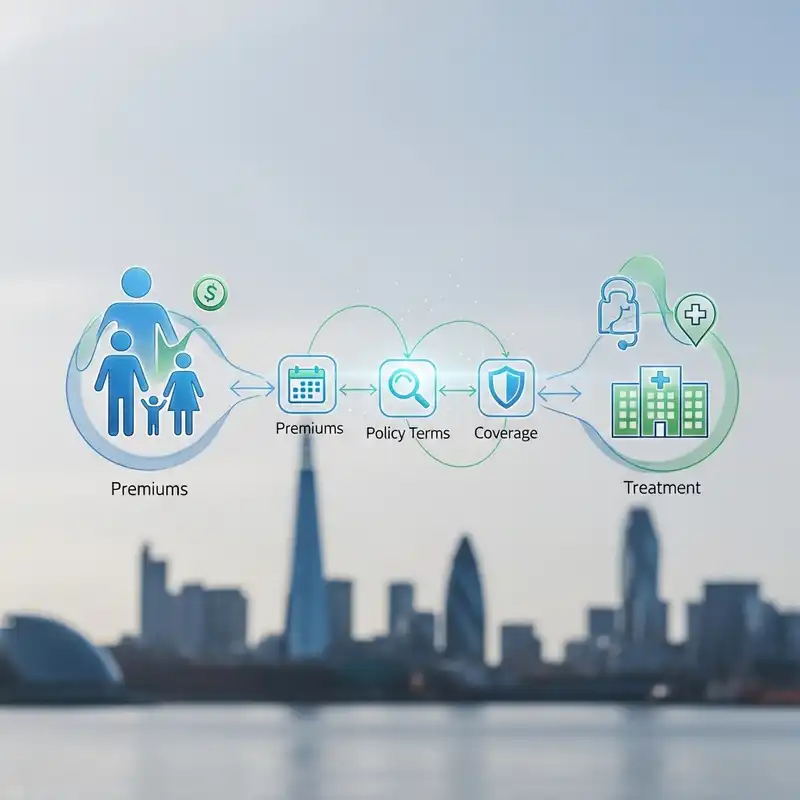TL;DR
A hidden health crisis is unfolding across the United Kingdom. It doesn't have a dramatic name or a sudden onset, yet it's silently placing an estimated 8 million Britons at severe risk of life-altering events like heart attacks, strokes, and dementia. This isn't a new virus; it's a combination of common, often undiagnosed, conditions that are reaching a critical point in 2025.
Key takeaways
- Step 1: Know Your Risk (Today). Go back to the risk factor checklist. Be honest with yourself. Talk to your parents and siblings about their health history. Understanding your personal risk profile is the starting point.
- Step 2: Get Checked (This Month). Don't put it off. If you're over 40 and receive an NHS Health Check invitation, book it immediately. If not, visit a local pharmacy for a blood pressure check or speak to your GP about your concerns.
- Step 3: Understand Your Numbers (This Month). When you get your results, compare them to the 'Know Your Numbers' table in this guide. Ask the healthcare professional to explain what they mean for you.
- Step 4: Make Small, Sustainable Changes (This Week). You don't need to overhaul your life overnight. Start small. Swap one sugary drink for water. Add a 15-minute brisk walk to your lunch break. Use a tool like the CalorieHero app to become more mindful of what you're eating. Small changes, sustained over time, have a huge impact.
- Step 5: Consider Your Health Security (Now). While you are feeling well, evaluate your options. Think about how you would want to handle a future health scare. Would the speed and choice offered by private medical insurance provide valuable peace of mind for you and your family? Investigate your options before a diagnosis makes that choice for you.
UK 2025 Is a Silent Killer Endangering 8 Million Britons Discover How Early Detection Shields Your Future Health
A hidden health crisis is unfolding across the United Kingdom. It doesn't have a dramatic name or a sudden onset, yet it's silently placing an estimated 8 million Britons at severe risk of life-altering events like heart attacks, strokes, and dementia. This isn't a new virus; it's a combination of common, often undiagnosed, conditions that are reaching a critical point in 2025.
The aftershocks of the pandemic, combined with modern lifestyles and an over-stretched NHS, have created a perfect storm. Millions are walking around with dangerously high blood pressure, elevated cholesterol, and pre-diabetes, completely unaware of the ticking time bomb within.
The good news? This is a battle you can win. The most powerful weapon in your arsenal is knowledge, followed closely by early detection. This definitive guide will illuminate the threat, reveal how to assess your personal risk, and explore how you can take control of your health, both through proactive lifestyle changes and the strategic safety net of private medical insurance.
The Unseen Epidemic: Deconstructing the 'Silent Killer'
The term 'silent killer' isn't just a dramatic headline; it's a medical reality. It refers to a trio of conditions that often present with no noticeable symptoms until they cause catastrophic damage. Let's break down these invisible threats.
1. High Blood Pressure (Hypertension)
Often called the 'silent assassin', high blood pressure is astonishingly common. It means the pressure of the blood in your arteries is consistently too high, forcing your heart to work harder and damaging the delicate lining of your arteries over time.
- The Scale of the Problem: The British Heart Foundation (BHF) estimates that up to 15 million adults in the UK have high blood pressure, but a staggering 5 million of them are currently undiagnosed and untreated.
- Why is it Silent? You can have high blood pressure for years without a single symptom. Headaches or dizziness are sometimes attributed to it, but these are rarely a reliable indicator. The only way to know is to get it measured.
- The Consequences: Uncontrolled hypertension is the single biggest risk factor for stroke. It also significantly increases your risk of:
- Heart attack
- Heart failure
- Kidney disease
- Vascular dementia
- Aortic aneurysms
2. High Cholesterol
Cholesterol is a fatty substance essential for building healthy cells. But too much of the 'bad' type (LDL cholesterol) can lead to a dangerous build-up in your arteries, a process called atherosclerosis. This narrows the arteries, making it harder for blood to flow through.
Many are unaware because, like hypertension, it produces no symptoms.
- The Ticking Clock: This build-up of fatty plaques can happen slowly over decades. A plaque can suddenly rupture, forming a clot that blocks blood flow to the heart (causing a heart attack) or the brain (causing a stroke).
- Good vs. Bad: It's not just about your total cholesterol. The ratio of 'good' HDL cholesterol (which helps clear arteries) to 'bad' LDL cholesterol is a critical health marker.
3. Pre-diabetes and Undiagnosed Type 2 Diabetes
Pre-diabetes is a state where your blood sugar levels are higher than normal but not yet high enough to be diagnosed as Type 2 diabetes. It's a critical warning sign.
- A Looming Crisis: Diabetes UK estimates that around 7 million people in the UK are living with pre-diabetes, significantly increasing their risk of developing Type 2 diabetes. Furthermore, nearly a million people are thought to be living with undiagnosed Type 2 diabetes.
- The Link to Heart Health: High blood sugar levels damage blood vessels throughout the body, making them more prone to the atherosclerosis caused by high cholesterol. People with diabetes are two to three times more likely to have a heart attack or stroke.
The Deadly Trio: A Multiplier Effect
These three conditions rarely exist in isolation. They feed off each other, creating a risk profile that is far greater than the sum of its parts. A person with high blood pressure, high cholesterol, and pre-diabetes is facing a significantly compounded risk of a major cardiovascular event.
| Condition | How It Affects the Body | Common Partner Conditions |
|---|---|---|
| High Blood Pressure | Damages artery walls, making them prone to plaque build-up. | High Cholesterol, Diabetes |
| High Cholesterol | Narrows arteries with fatty plaques (atherosclerosis). | High Blood Pressure, Diabetes |
| Pre-diabetes | High blood sugar damages blood vessels and nerves. | High Blood Pressure, High Cholesterol |
This dangerous synergy is what makes the 'silent killer' so formidable. You may feel perfectly fine, but internally, your cardiovascular system could be under immense strain.
Are You One of the 8 Million? Assessing Your Personal Risk
While the 'silent trio' forms the core of the risk, several other factors determine your personal vulnerability. It’s crucial to take an honest look at your own lifestyle and genetics to understand where you stand.
Ask yourself the following questions. The more you answer 'yes' to, the more vital it is to seek a professional health check.
Key Risk Factors Checklist
- Age: Are you over 40? Risk naturally increases with age.
- Family History: Do you have a close relative (parent or sibling) who had a heart attack or stroke before the age of 60?
- Ethnicity: Are you of South Asian, African, or Afro-Caribbean descent? These groups have a genetically higher risk of high blood pressure and Type 2 diabetes.
- Weight: Is your Body Mass Index (BMI) over 25 (overweight) or 30 (obese)? Carrying excess weight, particularly around your middle, is a major risk factor.
- Diet: Is your diet often high in salt, sugar, and saturated/trans fats? Do you eat fewer than five portions of fruit and vegetables a day?
- Activity Level: Do you get less than 150 minutes of moderate-intensity exercise (like brisk walking) per week?
- Smoking: Are you a current or former smoker? Smoking is one of the single worst things you can do for your heart health.
- Alcohol Intake: Do you regularly drink more than the recommended 14 units of alcohol per week?
A Real-Life Example: Meet Sarah
Sarah is a 49-year-old marketing manager from Manchester. She feels healthy, works long hours, and enjoys socialising with colleagues. She considers herself 'a bit overweight' but assumes it's just middle age. Her father had high blood pressure, but she's never been checked herself. She often grabs takeaway lunches and unwinds with a couple of glasses of wine most evenings.
On paper, Sarah feels fine. Her age, family history, diet, alcohol intake, and likely BMI put her squarely in the high-risk category for undiagnosed hypertension and high cholesterol. She is exactly the kind of person this guide is written for.
The Power of Early Detection: Your First Line of Defence
If this article has made you feel concerned, that is a positive first step. Awareness is the precursor to action. The single most effective way to defuse this ticking time bomb is through early and regular health screening. You cannot manage what you do not measure.
Essential Health Checks Available to You
- The NHS Health Check: Offered free in England to everyone aged 40-74 once every five years. It's designed specifically to spot the early signs of the 'silent killer' trio, as well as kidney disease and dementia. It involves simple questions and straightforward tests for your blood pressure, cholesterol, BMI, and diabetes risk. If you are invited, you must go.
- Pharmacy Services: Many high-street pharmacies (like Boots, Lloyds, and local independents) now offer affordable, walk-in blood pressure checks and sometimes even cholesterol and diabetes screening. This is an incredibly convenient way to get a quick snapshot of your health.
- Your GP Surgery: If you have specific concerns or fall outside the NHS Health Check criteria but have risk factors (like a strong family history), don't hesitate to book an appointment with your practice nurse or GP to discuss getting your numbers checked.
Know Your Numbers: Your Personal Health Dashboard
Understanding the results is just as important as getting the test. These are the key numbers that provide a window into your cardiovascular health.
| Health Marker | What It Measures | Healthy Target (2025 Guidelines) | At-Risk / High |
|---|---|---|---|
| Blood Pressure | Force of blood on artery walls (systolic/diastolic) | Below 140/90 mmHg (ideally near 120/80) | 140/90 or above |
| Total Cholesterol | Total amount of cholesterol in your blood | 5 mmol/L or below | Above 5 mmol/L |
| LDL ('Bad') Cholesterol | The type that clogs arteries | 3 mmol/L or below | Above 3 mmol/L |
| HbA1c (Blood Sugar) | Average blood sugar over 2-3 months | Below 42 mmol/mol | 42-47 (Pre-diabetes), 48+ (Diabetes) |
| BMI (Body Mass Index) | Measure of body fat based on height & weight | 18.5 - 24.9 | 25-29.9 (Overweight), 30+ (Obese) |
Note: These are general targets. Your doctor may recommend different targets based on your overall health profile and other risk factors.
Getting checked and knowing these numbers transforms an invisible threat into a manageable condition.
Navigating the System: How Private Medical Insurance (PMI) Accelerates Diagnosis
The NHS is a national treasure, and its screening programmes are invaluable. However, the system is under unprecedented strain. As of early 2025, NHS England waiting lists for consultant-led treatment remain historically high, with millions waiting for appointments and diagnostic tests.
This is where Private Medical Insurance (PMI) can act as a powerful accelerator, complementing the NHS by providing speed, choice, and peace of mind when you need it most.
Imagine your GP suspects a heart issue based on your symptoms or an initial check. On the NHS, you might face a wait of several weeks or even months for a referral to a cardiologist, followed by another wait for essential diagnostic tests like an echocardiogram or a CT scan.
With a comprehensive PMI policy, the journey can be dramatically different:
- Swift Specialist Access: Your GP can provide an open referral, and you could be seeing a private cardiologist within days.
- Rapid Diagnostics: PMI policies are often built around fast-tracking diagnosis. Access to MRI, CT scans, and other advanced imaging can happen in a week or less, rather than months. This speed is critical for getting an accurate diagnosis and starting the right treatment plan promptly.
- Choice and Control: You can choose your specialist and the hospital where you receive your tests and treatment, giving you a greater sense of control over your healthcare journey.
At WeCovr, we specialise in helping clients understand these benefits. We navigate the complexities of the PMI market, comparing policies from all leading UK insurers to find cover that prioritises comprehensive diagnostic tests and swift access to specialists, ensuring you get answers when you need them most.
The Critical Rule of UK Health Insurance: Pre-Existing and Chronic Conditions
This is the single most important concept to understand about private medical insurance in the UK. It is a non-negotiable principle across the entire industry.
Standard UK private medical insurance does not cover pre-existing or chronic conditions.
Let’s be absolutely clear about what this means.
- Pre-existing Condition: Any disease, illness, or injury for which you have experienced symptoms, received medication, advice, or treatment before your policy start date.
- Chronic Condition: A condition that is long-term and requires ongoing management but has no known cure. It is characterised by a need for special rehabilitation, monitoring, or a pattern of remissions and relapses.
High blood pressure, high cholesterol, and diagnosed diabetes are all considered chronic conditions.
Once you are formally diagnosed with one of these, a standard PMI policy will not cover the ongoing GP visits, medication, or management for that specific condition.
| Type of Condition | Description | Covered by PMI? | Example |
|---|---|---|---|
| Acute Condition | Short-term, likely to respond to treatment and lead to recovery. | Yes | A broken leg; hernia repair; a heart attack requiring surgery. |
| Chronic Condition | Long-term, incurable, requires ongoing management. | No (for the condition itself) | Asthma; diagnosed high blood pressure; arthritis; diabetes. |
So, what is the point of having PMI?
The immense value of PMI lies in securing it before these silent killers are diagnosed. It acts as a shield for the future.
Your policy is there to cover the acute conditions that may arise after you join. If your undiagnosed high blood pressure leads to a sudden, acute event like a heart attack, your PMI policy would swing into action to cover the emergency surgery, hospital stay, and cardiac rehabilitation needed to get you back on your feet. It covers the new, unexpected, and treatable events.
This is why it's so critical to consider your health insurance options while you are still healthy. Securing a policy before these conditions are noted on your medical record ensures you have the broadest possible coverage for future, unforeseen problems.
A Proactive Approach: How PMI Plans Encourage Healthy Living
In 2025, private health insurance is no longer just a reactive product for when you fall ill. The best providers have evolved to become proactive health partners, actively rewarding you for living a healthier lifestyle. They understand that preventing illness is better for everyone.
Modern policies often include a suite of wellness benefits designed to help you manage your risk factors:
- Gym Discounts and Fitness Rewards: Major insurers like Vitality and Aviva have pioneered models that offer significant discounts on gym memberships, fitness trackers, and even healthy food, rewarding you for staying active.
- Digital GP Services: Get 24/7 access to a GP via your smartphone for quick advice and prescriptions, preventing small issues from becoming bigger problems.
- Mental Health Support: Recognising the link between stress and heart health, most policies now include access to mental health support, from mindfulness apps to direct access to therapists.
- Proactive Health Screenings: Many plans now include a certain number of health checks as part of the package, helping you stay on top of your key numbers.
Going a step further, we at WeCovr believe in empowering our clients daily. That's why every customer receives complimentary access to our exclusive AI-powered calorie and nutrition tracker, CalorieHero. Managing your diet is fundamental to controlling blood pressure, cholesterol, and blood sugar. CalorieHero is our way of providing a practical, day-to-day tool to help you manage these key lifestyle factors and prevent the very conditions we've discussed. It's a testament to our commitment to your long-term health, not just your insurance cover.
Choosing the Right Shield: How to Select a Health Insurance Policy
With so many options on the market, choosing the right PMI policy can feel overwhelming. Focusing on the features that matter most for early detection and comprehensive treatment is key.
Key Policy Features to Scrutinise:
- Diagnostic Cover: Is it comprehensive? Some basic policies may only cover diagnostics once you are admitted to hospital. A good policy will have a strong 'outpatient' benefit that covers specialist consultations and scans before a hospital stay is needed.
- Outpatient Limits: Check the financial or numerical limit on outpatient consultations. A generous limit ensures you can see specialists as many times as needed to get a firm diagnosis.
- Cancer Cover: This is a core component of most PMI policies. Check that it is comprehensive, covering diagnosis, surgery, chemotherapy, radiotherapy, and even experimental treatments.
- Hospital List: Insurers have different tiers of hospital lists. Ensure the hospitals you would want to use are included in your chosen plan.
- Excess Level: This is the amount you agree to pay towards any claim. A higher excess will lower your premium, but make sure it's an amount you can comfortably afford.
The Value of an Expert Broker
Trying to compare these variables across dozens of policies from insurers like Bupa, AXA Health, Aviva, and Vitality is a complex task. This is where a specialist broker becomes an invaluable ally.
Navigating these options can be daunting. As expert brokers, WeCovr's role is to simplify this for you. We leverage our deep knowledge of the market to:
- Listen to your needs and understand your health priorities and budget.
- Compare the entire market on your behalf, explaining the pros and cons of each policy in plain English.
- Highlight the crucial differences in cover, particularly around diagnostics and wellness benefits.
- Ensure you get the right cover at a competitive price, with no nasty surprises down the line. We don't just sell a policy; we provide clarity and long-term support.
Your Action Plan for a Healthier Future
Knowledge without action is powerless. Use the information in this guide to build a simple, effective action plan to shield your future health.
- Step 1: Know Your Risk (Today). Go back to the risk factor checklist. Be honest with yourself. Talk to your parents and siblings about their health history. Understanding your personal risk profile is the starting point.
- Step 2: Get Checked (This Month). Don't put it off. If you're over 40 and receive an NHS Health Check invitation, book it immediately. If not, visit a local pharmacy for a blood pressure check or speak to your GP about your concerns.
- Step 3: Understand Your Numbers (This Month). When you get your results, compare them to the 'Know Your Numbers' table in this guide. Ask the healthcare professional to explain what they mean for you.
- Step 4: Make Small, Sustainable Changes (This Week). You don't need to overhaul your life overnight. Start small. Swap one sugary drink for water. Add a 15-minute brisk walk to your lunch break. Use a tool like the CalorieHero app to become more mindful of what you're eating. Small changes, sustained over time, have a huge impact.
- Step 5: Consider Your Health Security (Now). While you are feeling well, evaluate your options. Think about how you would want to handle a future health scare. Would the speed and choice offered by private medical insurance provide valuable peace of mind for you and your family? Investigate your options before a diagnosis makes that choice for you.
Taking Control of Your Heart Health in 2025 and Beyond
The threat posed by the 'silent killer' combination of high blood pressure, high cholesterol, and pre-diabetes is real, and it is affecting millions of people across Britain. In 2025, waiting to feel unwell is no longer a viable health strategy.
You now have the knowledge to understand the risk and the tools to fight back. Early detection through regular checks is your shield. Proactive lifestyle management is your sword. And a robust health security plan, like a well-chosen private medical insurance policy, is your armour against the unexpected acute events of the future.
Don't be one of the 8 million caught unawares. Take control, get checked, and make a conscious decision today to protect your health for all your tomorrows.
Sources
- NHS England: Waiting times and referral-to-treatment statistics.
- Office for National Statistics (ONS): Health, mortality, and workforce data.
- NICE: Clinical guidance and technology appraisals.
- Care Quality Commission (CQC): Provider quality and inspection reports.
- UK Health Security Agency (UKHSA): Public health surveillance reports.
- Association of British Insurers (ABI): Health and protection market publications.

































